
URGENT UPDATE: A groundbreaking initiative has been unveiled to reclaim Australia’s outback from invasive predators like foxes and cats. Researchers announced a 20-year plan aimed at breeding “smart” native marsupials capable of evading these threats. This radical approach could transform the landscape of the Australian wilderness, impacting local ecosystems and conservation efforts significantly.
The project, led by Rebecca West from the UNSW Centre for Ecosystem Science, aims to alter the behavior of species such as western quolls, bilbies, and golden bandicoots, which faced extinction in New South Wales over a century ago. This urgent effort follows years of ineffective methods that attempted to scare these animals into avoiding predators without success.
“Historically, we would train animals by creating negative experiences with predator sounds or scents, but that didn’t translate to real-life situations,” West explained. The team is now employing a method called in-situ predator exposure, which allows the marsupials to encounter real threats in a controlled setting, enhancing their survival instincts.
This ambitious project is part of the Wild Deserts Partnership Project, a collaboration involving the NSW National Parks and Wildlife Service and the Taronga Conservation Society Australia. Initial trials conducted in South Australia revealed promising results, with 350 burrowing bettongs demonstrating increased caution and adaptability in low-cat density areas.
Within the next two years, the team has released 51 western quolls, 305 bilbies, and 234 golden bandicoots into the Wild Training Zone, a 104-square-kilometre section of Sturt National Park. Researchers managed to maintain low cat populations through various methods, including fencing and targeted removal.
“Some of those species are being eaten by cats, but this is crucial for their learning process,” West noted. Early evidence suggests that over 90 percent of bilbies, 70 percent of quolls, and a significant number of golden bandicoots have survived. This success indicates that the plan may soon lead to natural breeding in their new habitats.
West expressed pride in the project’s daring nature, stating, “Taking on such a radical plan takes guts. It’s the only way we can ensure long-term improvements for these animals.” However, the initiative also faces challenges, as Australia struggles with the worst mammalian extinction record globally, compounded by climate change, habitat destruction, and invasive species.
As foxes and cats continue to encroach upon natural habitats, the survival of native marsupials is at stake. “In the next 10 to 20 years, we hope to see these animals thrive beyond predator-proof zones and into their natural landscapes,” West emphasized.
The project not only aims to bolster species populations but also seeks to restore the delicate balance of Australia’s desert ecosystems, which have been disrupted by the decline of these key species. As this initiative unfolds, it could redefine conservation strategies across Australia and inspire global efforts to combat biodiversity loss.
Stay tuned for updates as this revolutionary program progresses in the coming months and years. The future of Australia’s unique wildlife hangs in the balance, and the world is watching closely.







